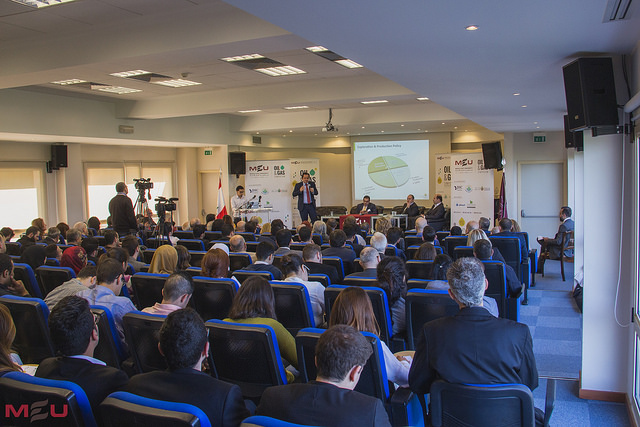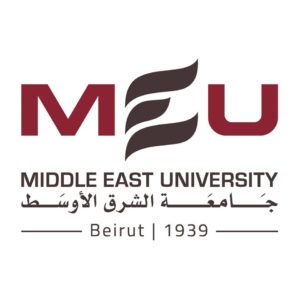Oil & Gas Symposium at MEU
Middle East University, under the patronage of His Excellency Arthur Nazarian, and with the support of prominent sponsors, hosted a high-level international Oil & Gas Symposium Friday, March 11, 2016. Over 400 VIPs, keynote speakers, students, and MEU representatives attended the 7-hour event highlighting vital topics relevant to the energy sector in Lebanon today and the impact of the world economy and global financial markets on future exploration and expansion. Keynote speakers shared presentations in their areas of expertise and answered questions during the panel discussions and networking lunch.

We thank Dean Patrizia Hongisto, MEU Faculty of Business Administration, Dr. Leif Hongisto, MEU President, Mr. Jihad Hokayem, consultant and co-sponsor from JHC Consultancy, and the many volunteers who coordinated the Oil & Gas Symposium and ensured its success.
The event began with registration where each guest received a name tag and MEU bag with gifts then moved to the full auditorium. Moderator Dr. Hasan Younes, co-founder and Managing partner at INSIGHTS’ For Consultancy, welcomed and opened the session with the national anthem. On behalf of MEU, Dr. Leif Hongisto, President, extended a warm welcome to ambassadors, dignitaries, keynote speakers, and special guests and expressed his desire that the symposium would be successful in discussing how to use the natural resources for the benefit of the Lebanese people. The opening ceremonies concluded with a speech by His Excellency, Arthur Nazarian, Minister of the Ministry of Energy & Water, and presented on his behalf by Mr. Wissam Zahabi, President of the Petroleum Association (LPA).
First Panel
The first panel discussion focused on the technical perspective of oil and gas. The panel included Mr. Wissam Zahabi, Mr. Wissam Chbat, Mr. Assem Abou Ibrahim, and Mr. Ali Berro. Mr. Zahabi recommended a focus on a sustainable economy that isn’t solely dependent on oil & gas and a careful consideration of how to use the blocks for maximum economy absorption. He laid out the role of the LPA, including advanced scenario planning, licensing strategy, national oil spill contingency plan, and more and recommended looking to the future as a regulatory framework is built. Mr. Chbat, head of Geology and Geophysics at the LPA, then presented geological risks and uncertainties, including the Upstream Value Chain, which is the process of finding, drilling, and closing a site of oil or gas. He stated that Lebanon has a very complex yet promising geology and recommended investing more in understanding the petroleum system.
Mr. Ibrahim, head of QHSE, LPA, spoke about geological risks and uncertainties. He presented the risk-based hybrid system, a recently developed governance model. Mr. Berro, expert on petroleum and policies, presented the Sovereign Wealth Fund with its legal and financial perspectives. Mr. Berro described these funds as insulating the budget and economy from the effects of commodity price volatility.
Second Panel
The second panel discussion focused on the challenges and opportunities of the oil and gas sector. The first presenter, His Excellency Dr. Charbel Nahas, economist and former Minister of Labor for Lebanon, spoke about the effects of oil revenues on the economy and fiscal policy. He was followed by Dr. Elie Yachoui, professor and economist at Notre Dame University. Dr. Yachoui presented regulations in relation to the oil and gas sector and spoke about the energy sector’s efficiency and its effects on the Lebanese economy. Dr. Kamal Hamden, economist and executive director at Consultation and Research Institute, then presented the need for Local Content Policies in relation to oil. Finally, Mr. Nassib Ghobril, chief economist at Byblos Bank, wrapped up the panel by discussing the current and future impact of oil and gas on the Lebanese economy. Mr. Ghobril proposed considering reality before forming expectations as a minimum of 7 to 10 years are necessary for growth in the energy sector should explorations began immediately.
Third Panel
A catered networking luncheon provided opportunity to meet with the speakers, then the symposium resumed with a third panel on the global perspective of oil and gas and its implications for Lebanon. Dr. Fady Geara, Dean of Ecole Supperier des Ingenieurs de Beyrouth, Universite Saint Joseph, took an academic perspective, considering the role of universities in developing leadership by higher education graduates in the engineering field which is currently limited. He outlined the need to build effective academic programs that include technical and managerial skills so graduates can shape the global workforce into a productive unified culture.
Mr. Habib Maroun, head of Capital Markets in Lebanon, Fidus – SGBL Group, considered investor sentiment and the price of oil. He focused on sentimental asset analysis, one of three types of asset analyses, and noted that psychology plays a significant role in oil pricing such as the negative news in January about the price of oil affecting the banks in Europe. He was followed by Mr. Hassan Hamadi, associate professor of finance at Notre Dame University, who discussed the effect of the global economy on oil prices. Mr. Hamadi presented studies showing fluctuation of oil prices related to supply and demand factors and market speculators, among a number of factors. As the US dollar is backed by black gold, or oil, and is the global reserve currency, if the system broke Mr. Hamadi proposed that it would lead to hyperinflation. Mr. Hamadi also noted a growth trend in global oil demand and total world oil consumption.
Mr. Ghassan Kteily, AGM – Chief Growth Officer, Royal, presented online trading of oil, noting that crude oil is a trading investment and is tradable as a future contract on future exchanges. Mr. Kteily described different options to trade online, including futures, hedging funds, options, and swaps, OTC, and CFDs. He stated that an e-platform supports easier accessibility, liquidity depth, and price transparency. Mr. Jihad El Hokayem, chief financial markets strategist, JHC Consultancy, wrapped up the panel by speaking about the pricing game and forecasting, warning that while the decrease in oil prices has an immediate positive result as purchasing power increases, it will have a long-term negative effect as it becomes harder to find employment. Mr. El Hokayem has observed that negative effects are felt on the Lebanese economy after a 20 months’ time lag so it should begin to impact the economy in October 2016. He predicted that oil will decrease to 66 USD per barrel by the end of the year, fluctuate between 30 to 60 USD for a period of time, increase to 75 to 78 USD by 2017 and end at 91 USD by the end of 2017.
In Conclusion
Each panel concluded with an award ceremony where Dr. Hongisto presented each keynote speakers with an engraved oil drop glass award of recognition and appreciation for participating in the symposium at MEU. A special thank you was extended to all sponsors and partners, including the Ministry of Energy & Water, LPA, JHC Consultancy, Future TV, Business Echoes, and MEU for their support and presence.
The symposium Oil & Gas: Challenges and Horizons was initiated to consider challenges, opportunities, and the global aspect of the energy markets with implications for Lebanon. Under the excellent moderation of Dr. Hasan Younes and with a broad spectrum of presentations from leading experts, the event was successful in accomplishing its objective. It was a stimulating discussion and we look forward to continued educational collaborations in the future!






